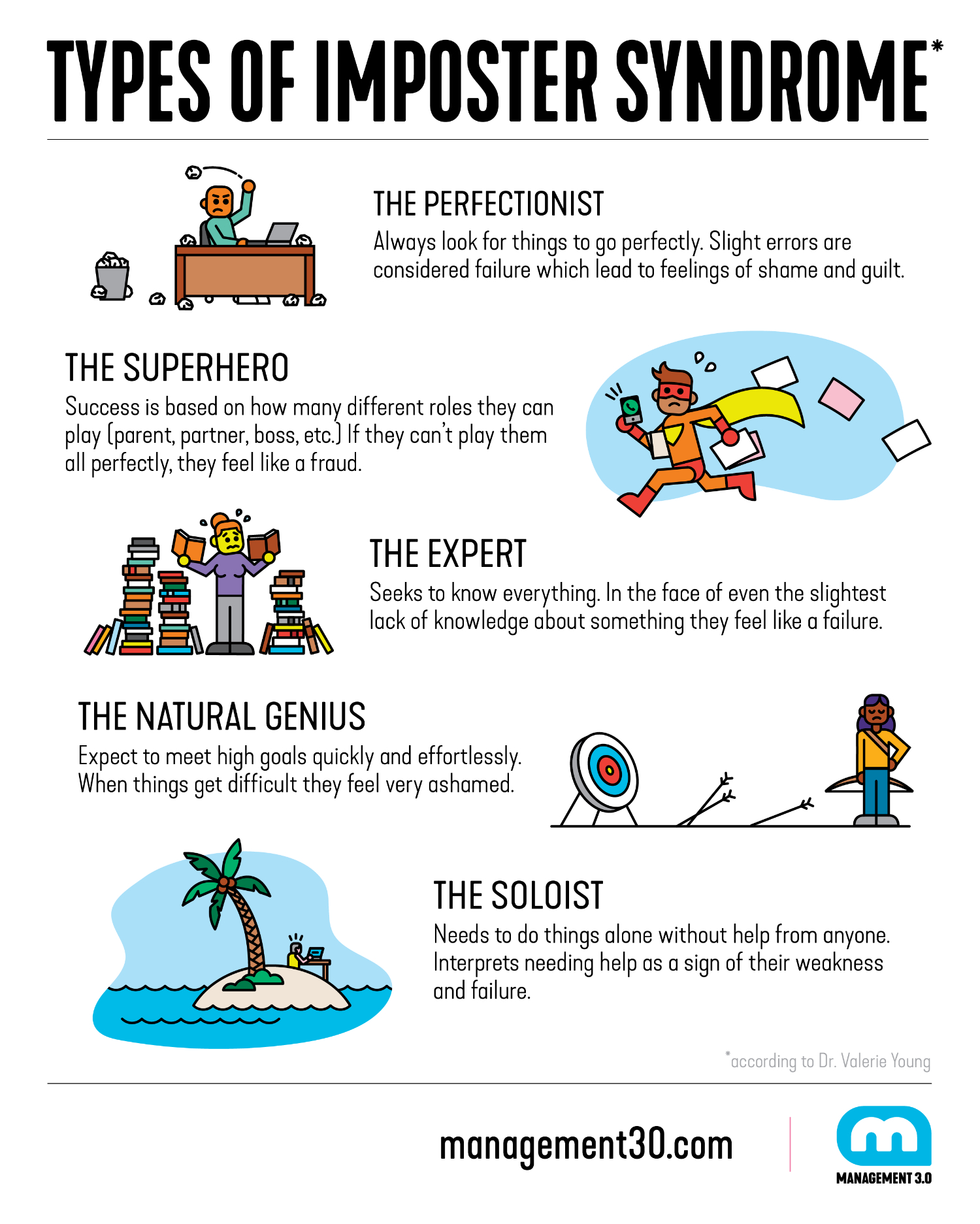An article by Dr Rashmi Narayana, a medical doctor, psychiatrist and leadership coach with a deep understanding of the subject of imposter syndrome and Guillermo Lechuga, a Management 3.0 facilitator who has contributed to the professional training of thousands of people around the world in leadership, agility and change management.
A few days ago we were talking to a friend about a great opportunity she had been offered. It terrified her. She is intelligent, professional, and competent at what she does. However, she has a hard time believing it. She also feels she doesn’t deserve the opportunities she gets, and worries that everything will go wrong. Despite overcoming similar challenges in the past and reassurances from her friends and family, she continues to struggle with these feelings.
At different times in our lives, we’ve felt this way too – unable to accept the opportunities which come along, feeling that we probably just got lucky, and that others see us in ways that aren’t accurate.
Have you felt like this?
You are not alone. There are many people who are managing the same feelings and thoughts and it is known as ‘Imposter Syndrome’.
What is Imposter Syndrome?
Imposter Syndrome is an internal experience characterized by a set of beliefs and thoughts which stop people from assimilating their achievements, praise and success, despite having evidence to the contrary. They tend to minimize and undermine their own success.
This term Imposter Phenomenon, now usually called imposter syndrome (IS) – was coined in the late 1970s by clinical psychologists Pauline Clance and Suzanne Imes when they observed that high achievers were unable to internalize, accept their success, often attribute their accomplishments to luck rather than to ability, and fear that others will eventually unmask them as a fraud.
There are studies that indicate that 70% of people have suffered with IS at one or more moments of their life.
Though imposter syndrome has been mainly associated with women, men struggle with it too. A recent study shows that while women self-reported more imposter feelings, men experienced IS as stress when getting negative feedback and when told their results would be shared with the professor. This suggests that men do worse when confronted with performance cues than women. Men experienced greater anxiety after receiving negative feedback than women with imposter feelings, and exhibited less effort and poorer performance on a task when held accountable to a higher authority.
What are the symptoms of Imposter Syndrome?
The core features of IS are the following beliefs and feelings:
- Others have an overinflated view of you and your capabilities.
- You’ll inevitably let everybody down.
- Your ability to do something negates it’s value.
- You experience catastrophic thinking related to consequences of any mistake (i.e. I will be fired from my job or not get that promotion since I came to a meeting five minutes late).
You feel:
- Persistent fear about being found out.
- Anxiety about success as you think it’s due to luck.
It is important to note that each person experiences imposter syndrome differently and with varying intensity.
The different types of Imposter Syndrome
Through several years of research Valerie Young found 5 competence (internal rules that people with imposter phenomenon follow) types:
- The perfectionist
They always look for things to go “perfectly”. Their main concern is “how” something is done. A slight error or defect is enough to classify it as a failure and it leads to feelings of shame and guilt. - The expert
Experts seek to know everything. Their main concern is about “what” and “how much” they know or can do. In the face of even the slightest lack of knowledge about something they feel like a failure. - The soloist
They need to do things alone without help from anyone. Their main concern is “who” completes the work. If someone helps them, they interpret it as a sign of their weakness and failure. - The natural genius
They aim to achieve their goals quickly and effortlessly. They begin to doubt themselves and feel very ashamed when things start to get difficult, they can’t achieve it in their first try. - The Super Man / The Super Woman
Their success is based on how many different roles they can play. They need to be a good father/mother, son, partner, boss, brother, and/or friend, among others. They always work longer and do not take days off. If they can’t play any of the many roles perfectly, they feel like a complete fraud.

Do you identify with more than one of these types? This is normal, however, we usually have a greater identification with one.
Striving for perfectionism can lead to burnout. Listen to How to Combat Leadership Burnout and read about Avoiding Burnout at Work
Why does it happen? Where does the Imposter Syndrome come from?
There are various reasons why we experience the syndrome.
- Transition or change
Imposter syndrome can be triggered or exacerbated during times of transition or change. A new job, a new role or a change in your non-work life such as becoming a parent can trigger or increase these feelings. All these events push you out of your comfort zone.
- Traditional gender norms
Gender norms affect men and women. There are fewer women than men holding senior positions. Despite the progress being made in representation, a woman’s success in career is compared with the impact on her family, which doesn’t happen to men. These types of conflicting messages hamper women from owning their success. The pressure society places on men to demonstrate high productivity and presence which places enormous pressure and expectations.
- Intersectionality and systemic bias
In recent years there has been increasing focus on the impact of intersectional factors on the experience of imposter syndrome.
Intersectionality: The intertwining of social identities such as gender, race, ethnicity, social class, religion, sexual orientation, and/or gender identity, which can result in unique experiences, opportunities, and barriers.
Source of definition: Catalyst
Imposter feelings can occur when you are the minority. For example you could be working in a company or team where you are the only person of color. This can make you feel like you don’t belong despite your qualifications and achievements. It could feel like you represent not just yourself but a social group increasing the pressure on you. The call to address existing conscious and unconscious bias rather than blame people for struggling with imposter syndrome is getting stronger. This recent article in Harvard Business Review highlights why we need to question the bias and discrimination rather then focus on imposter feelings.
Imposter Syndrome: Do I have it?
If you are wondering whether you suffer from IS, we invite you to consider the following questions:
- Do I feel that the opportunities I’ve had so far are due to luck?
- When I have new challenges, do I doubt my ability to meet them?
- Am I unmotivated about new opportunities?
- Do I think things that have gone well in the past are going to go wrong now?
- Do I worry that people will find out that you’re a fraud?
- Do I compare myself to other people?
- Am I not satisfied with the things I do?
- Do I think that I don’t deserve the success that I’ve had?
If you have answered “Yes” to several questions, it’s likely that you struggle with feeling like an imposter.There are free tests at Psychtest and Psycom that you can do to assess whether you have imposter syndrome.

How to deal with the Imposter Syndrome?
Please note: What we are sharing here does not replace formal support with a professional. If you are struggling with debilitating feelings of feeling like an imposter we recommend you seek professional help.
Question and reframe your thoughts
When you feel like an imposter ask yourself the following questions:
- Is this thought really true?
- Is what I am feeling related to a specific situation? Why?
- How does this thought help or hinder me?
- Is there an alternate way to look at the situation?
Asking ourselves these questions helps us reframe our thoughts, have a truer image of ourselves, and strengthen our self-esteem.
Acknowledge your experience and talk to someone
Talking about how we feel helps us to get perspective. Whether it’s a mentor, a friend, or family member, talk to someone you trust about how you’re feeling. Getting another perspective can shake our irrational beliefs. If you’re struggling a lot, consider working with a professional like a qualified therapist or a certified coach. Language is powerful and can open or close a world of possibilities. The next time you find yourself thinking of these thoughts, try to reframe them.
| Thought | Re-Frame |
|---|---|
| I can’t! | I can’t yet |
| I’m unable | I’m learning and will get better |
| The opportunities I get are due to luck | I get opportunities because I deserve them |
| I fear that people will realize I am a fraud! | People know that I’m competent |
| I’m scared! | I’m excited! |
| This will be a failure! | I’ve worked hard and I will do my best |
A mistake that we often make is to compare ourselves with others, sometimes with people who are years ahead of us. This hampers us from seeing.
Acknowledge your successes
People struggling with imposter feelings find it hard to accept praise and own or talk about their achievements. If you’re someone who feels this way you might find yourself saying phrases like “it’s nothing”, “it was luck” or even trying to immediately turn the recognition towards the other person. Next time just try saying thank you with a smile.
You can write down achievements, file away emails that highlight your good work and create a ‘feel good or my pride’ file. When your imposter feelings appear, take a look at this file to remind yourself that you’re not a fraud and that your achievements are real. Be kind to yourself when things don’t go as planned.
Show kindness and compassion to yourself
When something doesn’t go well, people managing imposter feelings tend to be hard on themselves. If you do the same, try asking yourself these questions:
- What can I learn from this situation?
- How can I remedy this problem?
- How can I prevent it from happening again?
- What can I do differently next time?
We’ve all been wrong more than once. Great inventions have happened through error. Many well known entrepreneurs have failed before finding success. When things don’t go as planned or we make mistakes it is not catastrophic as we tend to think. What can help us when we feel this way?
Self-compassion, being kind to yourself like you would to others, is increasingly being seen as key to moving from fear, self-doubt and paralysis, to clarity and action. Research on self-compassion has grown significantly over the past fifteen years, and studies show that the benefits align with several important leadership skills such as emotional Intelligence, resilience, growth mindset, integrity and compassion towards others.
The next time you find yourself in a similar situation, we recommend trying these self-compassion tools recommended by Prof. Kirstin Neff, a leading researcher.
- Mindfulness: Tell yourself, “this is hard right now” or “I’m feeling tense.” This allows you to not get overwhelmed by and help make decisions with more clarity and wisdom.
- Common humanity: “I’m not alone; others are facing similar challenges.” Recognizing that you’re not alone supports your well-being and your sense of connection with others.
- Self-kindness: “May I be kind to myself as I face this challenge” or “What would be kind right now?” Treating yourself well is essential for your own motivation and your capacity to help others.
What to do as a manager if someone in your team is struggling with imposter syndrome?
If you are in a leadership position, you can do your bit so that your team can fight their imposter feelings in the following ways:
- Generate spaces for reflection where they can verbalize their achievements and progress.
- Promote a culture of learning, where mistakes are used as an opportunity for reflection. The Celebration Grid practice combined with Yay! Questions can help.
- Encourage recognition among peers, of both results and behaviors. For example: if someone puts in a lot of effort but does not achieve the end goal, highlight the effort. Check Kudo Cards and Merit Money for further reference.
- Promote a culture of growth, where everyone has their own path, and each one takes a different route and time to get to their goals. Stay away from comparing team members or with other teams. Make people feel that they have your support and also that of the other members.
- Foster empathy in the team, be kind to the struggles each one may be going through.
- Lead by example and role model learning from mistakes and failures.

Acknowledgements
We thank Ailin Montiveros, Consuelo Medina, Serge Páez and the Management 3.0 team for their review of this article.
Dr. Rashm Narayanai is a medical doctor, psychiatrist, and leadership coach. She’s worked in leadership roles in health tech for the past ten years. She’s a Certified Professional Co-Active Coach (CPCC), and an ICF certified coach. She was also chosen as 1 of 100 Squiggly Career Advocates ’21 a program run by the award winning team at Amazing If, an award-winning career development company with an ambition to democratize career development. She uses tools from neuroscience, leadership theory, and psychology in her coaching practice. She’s passionate about intersectionality and supporting purpose driven professionals and founders become conscious leaders who take decisions from a place of clarity. Connect with her here: LinkedIn
Header photo by engin akyurt (via Unsplash)
Resources
- Mindful Leadership
- Emotional Intelligence for Leaders
- How Managers can Foster Confidence in Their Employees
- Why Good Leaders Care about Mental Health
As we sign off we’d like to remind you that imposter feelings are common and most struggle in private. There is nothing wrong with you. You are not alone.
Thank you for reading this article! We’d love to hear your thoughts and feedback on your experiences with Imposter Syndrome. Please do get in touch in the comments section below.


My goodness. I heard about this for the first time today and it was like you were writing about me. Wow. Thank you so so much for this.